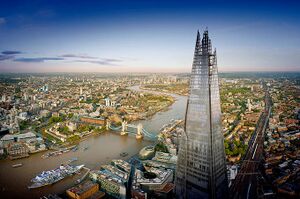Albion Investment Fund
 | |
 | |
| AIF | |
| Sovereign wealth fund | |
| Founded | June 12, 1976 |
| Headquarters | , |
Key people | Keir Starmer (CEO) Teddy Scott (Chairman) |
| AUM | $2.089 trillion |
| Owner | Government of the United Kingdom |
| Parent | Her Majesty's Treasury |
| Subsidiaries | Financial services: Barclays, HSBC, ING Group, Lloyds Banking Group, Standard Chartered, Bank of Ireland, Permanent TSB, Allied Irish Banks, Ulster Bank Automotive: Aston Martin, Lotus Cars, McLaren Group, Rolls-Royce Holdings, Volkswagen Group Aviation: Air Canada, British Airways, Qantas Technology and innovation: ASML Holding, ASOS, Prosus, Sage Group Energy and utilities: BP, Philips, Shell, SSE Healthcare and pharmaceuticals: ASML Holding, AstraZeneca, GlaxoSmithKline, Philips, Smith & Nephew Food and agriculture: Compass Group, Diageo, Heineken, Unilever, Tesco Creative industries: ITV, RELX, WPP |
The Albion Investment Fund (AIF) is the sovereign wealth fund of the United Kingdom. Established by the British government in 1976 to initially manage the revenue generated by the North Sea oil, it has since expanded and diversified into various industries including finance, technology, energy, and healthcare. With an estimated $2.08 trillion in assets, it is the world's largest sovereign wealth fund and one of only two alongside the Government Pension Fund of Norway to be valued at $1 trillion and above. Overall, its main aims include investing funds on behalf of the British government, strengthening the British economy, as well as preserving and enhancing the purchasing power of the United Kingdom's foreign reserves. The sovereign wealth fund's name Albion is the alternative name for Great Britain.
Established in 1976 during the premiership of Edward Heath, whose notably long tenure coincided with an increase in oil prices, particularly those in the nearby North Sea, the organisation was initially based at Tower 42 in London, where it remained for the next four decades, before eventually relocating in 2014 to The Shard, also in London, where it remains today. It is wholly owned by the Government of the United Kingdom which manages it via Her Majesty's Treasury, its finance department, with the Prime Minister of the United Kingdom serving as chief executive officer.